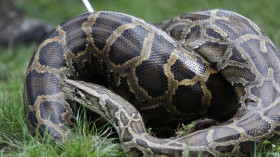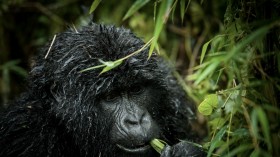Dopamine is a chemical messenger that plays a key role in learning, motivation and reward. It is also involved in many aspects of social behavior, such as communication, cooperation and competition.
But how does dopamine influence the brain and behavior of songbirds, especially during courtship?
Dopamine as an Error and Reward Signal
 (Photo : David McNew/Getty Images)
(Photo : David McNew/Getty Images)

Songbirds are among the few animals that can learn complex vocalizations from their parents or tutors.
They practice their songs repeatedly until they match the template stored in their memory. This process requires feedback from both internal and external sources.
One source of internal feedback is dopamine, which is produced by certain sets of brain cells called dopaminergic neurons.
Previous studies have shown that dopamine acts as an error signal, helping the bird to realize when it has made a mistake and did not quite replicate the song it had memorized.
When the bird makes an error, dopamine levels drop, indicating a need for correction.
On the other hand, dopamine also acts as a reward signal, reinforcing the bird's good performance.
When the bird gets the song right, dopamine levels rise, indicating a positive outcome. This way, dopamine helps the bird to fine-tune its song and achieve vocal accuracy.
Dopamine also modulates the activity of other brain regions involved in song learning and production, such as the basal ganglia and the motor cortex.
For instance, dopamine can enhance or suppress the activity of neurons in the subthalamic nucleus (STN), a part of the basal ganglia that regulates movement and timing.
Studying dopamine levels on songbirds
A recent study by Vikram Gadagkar, Ph.D., a principal investigator at Columbia's Zuckerman Institute and a co-first author showed that STN neurons signal song timing and error during singing and listening.
The researchers found that STN neurons fire more when the bird sings faster or slower than its template, or when it hears another bird singing out of sync.
They also found that STN neurons receive inputs from dopaminergic neurons in the ventral tegmental area (VTA), suggesting that dopamine modulates STN activity according to performance feedback.
Also Read: Songbirds Can Sing Like Humans With Complex Vocal Cords
Dopamine as a Social Signal
However, song learning is not only driven by internal feedback but also by external feedback from social interactions.
For example, when a male zebra finch sings to a female during courtship, he expects her to respond with calls that indicate her interest or rejection.
These calls provide valuable information for the male about his mating success.
Gadagkar measured variations in dopamine in situations where a bird is choosing between several objectives at once, such as practicing its song, finding water or winning a mate.
The researchers found that whenever courtship became part of the mix, the dopamine-based error signals linked to seeking water or song rehearsal were suppressed.
Simultaneously, the reward signal for performing a song well enough to elicit return calls from a female intensified.
This suggested that dopamine reflects the bird's intentions and priorities in different contexts.
When the bird is focused on impressing a potential mate, dopamine becomes more sensitive to social feedback than to self-evaluation.
This may help the bird to adapt its song and behavior to the preferences of the female and increase its chances of reproduction.
Dopamine also affects how the bird perceives and responds to social stimuli, such as other birds' songs or faces.
For example, Matheus Macedo-Lima, who performed the research in the lab of senior author Luke Remage-Healey as a Ph.D. student in UMass Amherst's Neuroscience and Behavior graduate program, showed that dopamine receptors are present in many types of neurons in the songbird auditory brain - they can be inhibitory or excitatory and may also contain an enzyme that produces estrogens.
The researchers found that dopamine can alter the responsiveness of these neurons to different sounds depending on their social relevance.
They also found that dopamine can induce plasticity in these neurons, making them more likely to change their connections and properties with experience
Related article: Some Breeding Songbirds Face a Mismatch as a Result of Climate Change
© 2024 NatureWorldNews.com All rights reserved. Do not reproduce without permission.





